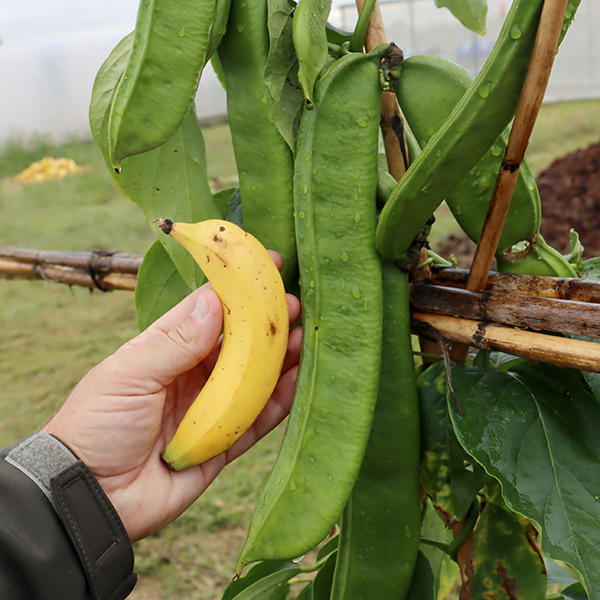Canavalia gladiata
The sword bean is a robust tropical climbing legume recognised for its strikingly long, flat pods and historical significance across Asia. Indigenous to tropical Asia and cultivated in countries like India, Japan, Indonesia and Taiwan, it has served diverse roles ranging from food to forage for centuries. Also known as the scimitar bean, this plant can grow up to 10 m in ideal tropical conditions and has been valued not only for its edible parts but also for its use as green manure and in soil rehabilitation.
Culinarily, sword bean is used at various stages of development. Young pods, harvested before seeds swell, are tender and resemble snow peas in texture. These can be steamed, stir-fried or pickled. In Japan, the beans are a traditional ingredient in fukujin-zuke pickles. In Indonesia, fermented preparations made from seeds are used in local cuisine. In Taiwan, the mature seeds feature in mooncake fillings. Mature beans are roasted as a caffeine-free coffee substitute, and the plant has traditional medicinal applications, including promoting urination and improving digestion.
Sword bean seeds are notoriously hard and require specific preparation to ensure safe germination. Begin by soaking the seeds in warm water for 24 hours to soften the seed coat. This enhances the uptake of moisture and boosts germination rates, which can exceed 90 % under ideal conditions. Sow seeds 1-2 cm deep in trays or directly outdoors once frost has passed and soil temperatures are consistently warm. Using bottom heat will support successful germination, and trellising is essential due to the plant's vigorous vining nature.
In cultivation, sword beans thrive in full sun and well-drained, compost-rich soil. They are suited to a wide range of pH levels and are particularly beneficial in rotational planting due to their nitrogen-fixing abilities. While fairly disease-resistant, they can be affected by anthracnose and Bean Common Mosaic Virus. Pods are typically ready for vegetable use around 90-100 days from planting, while mature seeds generally take up to 10 months to mature fully. Harvest young pods at 12-15 cm in length before the beans swell for the best flavour and texture. Locally, this is a long season crop, and you will need a minimum of 9 months of frost free growing for this variety to yield for you.
Beyond the kitchen, sword bean is employed as green manure, livestock forage and a cover crop. Its dense root system and rapid biomass production make it ideal for soil improvement and erosion control. Additionally, the plant’s nitrogen-fixing ability enhances soil fertility, making it a valuable intercropping choice in sustainable agriculture. It is also sometimes cultivated for ornamental purposes due to its striking flowers and large seed pods.
Due to its naturally occurring toxins, especially canavanine, cyanogenic compounds and lectins, dry sword bean seed requires processing before human consumption. Soaking dried seeds for 48-72 hours with daily water changes helps leach out harmful compounds. Peeling the soaked seeds further reduces toxins, as the seed coat contains high concentrations of canavanine. Boiling for at least 20 minutes post-soaking can reduce toxic elements by more than 50 % rendering the beans safe to eat. Fermentation is another effective method for toxin breakdown. These steps help to prevent adverse effects like gastrointestinal discomfort or immune suppression.
Livingseeds has been growing and selecting sword beans for seven years, focusing on developing a faster maturing line suitable for South African growers. This long-term effort has resulted in what is likely the fastest maturing sword bean variety currently available, reaching full maturity in just eight months. This significant improvement offers a real advantage to local gardeners seeking high-yielding legumes within a shorter season.
We have found that the beans are very pleasant to eat young, like snap peas... just a bit larger, or as a shelly bean before it has matured. It is also interesting to note that most people find this a pleasant tasting bean, some people cannot stand the flavour, so it's probably a cilantro/coriander type reaction.
These are a limited stock item and will be sold in packets of 3 seeds.
Sword Bean
- Product Code: 217-0000
- Availability: In Stock
-
R52.33


